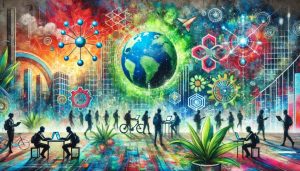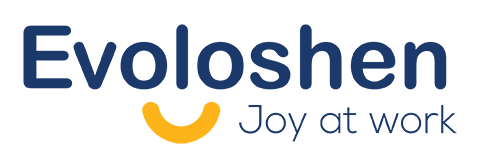
We are going to see more exponential change in the next five years than we’ve seen in the last 200 years! As we step into 2025, the workplace is undergoing profound transformation, which is driven by technological advancements, shifting employee expectations, and the need for greater purpose and trust in leadership.
Here are the top trends set to shape the year ahead:
- AI Integration Beyond Automation
Artificial Intelligence continues to expand its role in business, moving beyond automating tasks to becoming a key influence with strategic decision-making and employee engagement. According to Gartner, by 2027, 70% of organizations will integrate AI into their workflows. In 2025, we’ll see a focus on human-centered AI, where technology complements rather than replaces the workforce. This is a much-needed mindset shift to adopting AI.
Key Insight: Companies leading in AI adoption will prioritize training employees on how to effectively collaborate with AI, building confidence and trust in these systems.
- Trust Continues to be a Global Currency
Trust will solidify its place as the cornerstone of organizational success. It is the foundation to creating a great company culture. With employees navigating hybrid work environments and increasing digital interactions, building trust at every level will be non-negotiable. Research from Edelman’s Trust Barometer shows that 60% of employees prioritize trust in leadership over compensation. Trust in your own company ranks higher than any other area currently.
Action Step: Leaders must demonstrate transparency, authenticity, and align decisions with the company’s values to foster a culture of trust.
- Purpose-Driven Leadership Takes Center Stage
Purpose is no longer a buzzword or being whitewashed—it’s a business imperative. Employees and customers alike expect organizations to stand for something meaningful—not just a window dressing to make the company look good. Deloitte’s Global Human Capital Trends report reveals that purpose-driven organizations outperform their peers in innovation, engagement, and profitability.
What to Watch: Companies will focus on embedding purpose into daily operations, ensuring employees see how their work contributes to a greater mission. This will continue to help with recruiting and retaining great staff.
- Reskilling Becomes a Competitive Advantage
The World Economic Forum predicts that 50% of the global workforce will need reskilling by 2025. With AI and other technologies evolving rapidly, organizations must invest in continuous learning to stay competitive. Reskilling initiatives will focus on fostering adaptability, creativity, and problem-solving—skills that technology can’t replicate—which is good news! Developing employees will give a competitive edge.
Best Practice: Partner with educational platforms and cutting edge trainers to leverage AI-driven training tools in order to personalize learning experiences for employees.
- Well-Being as a Strategic Priority
Employee well-being will move beyond wellness programs to becoming an integral part of business strategy. A Gallup report found that employees who feel their well-being is supported are 69% more likely to stay with their employer. In 2025, well-being initiatives will encompass mental, emotional, and financial health, alongside physical health. With the great AI strategies and tools, overwhelm and stress can decrease which is an essential change.
Tip: Encourage flexibility and provide resources that address holistic well-being, such as mental health apps and financial planning tools.
- The Rise of Ethical AI
As AI will be everywhere, organizations will face increasing pressure to ensure its ethical use. From data privacy to unbiased algorithms, ethical AI will be critical to maintaining public trust. A report by PwC emphasizes that 80% of consumers expect companies to ensure AI is used responsibly.
Trend Alert: Expect more companies to establish ethical AI committees and include AI ethics in employee training programs.
- Hybrid Work Becomes the Norm
The hybrid work model is here to stay, but organizations will refine their approaches to make it sustainable. The emphasis will be on creating equity in hybrid environments, ensuring remote workers have the same opportunities as in-office employees. Employers will continue encouraging the importance of collaboration and connections, especially with the time in the office.
What’s Next: Investments in technology that enhances collaboration and inclusion, such as virtual reality meeting spaces and AI-powered scheduling tools.
- Personalized Employee Experiences
In 2025, organizations will place a stronger emphasis on tailoring the workplace experience to individual employees. By leveraging AI and data analytics, companies can offer personalized career paths, training programs, and well-being resources. Employees will be empowered with creating their own career paths, development, and long-term goals.
Emerging Practice: Use predictive analytics to identify employees’ needs and provide solutions before challenges arise, boosting engagement and retention.
- Leadership Development for a New Era
Leaders in 2025 will need to be agile, empathetic, and tech-savvy. Traditional leadership models will give way to approaches that prioritize emotional intelligence and adaptability. The hierarchy is shifting to a more distributed model, especially where trust levels are high, and people are purpose driven. Toxic leaders will not be tolerated.
Pro Insight: Harvard Business Review notes that organizations with emotionally intelligent leaders are 36% more likely to retain employees during periods of change.
- Sustainability Embedded in Strategy
Sustainability has moved from being a corporate social responsibility (CSR) initiative to a business necessity. Companies that prioritize sustainability and communicate it well will attract talent, customers, and investors. According to McKinsey, sustainable companies are 2.6x more likely to remain resilient in the face of global challenges.
Emerging Practice: Incorporate sustainability goals into daily decision-making and leverage AI to track progress in real time.
Final Thoughts
2025 promises to be a year of transformation, where the integration of AI, purpose, and trust shapes the future of work. Organizations that embrace these trends proactively will not only thrive but set a new standard for leadership and innovation.
Which of these trends are you most excited about? Let’s start the conversation.
If you are ready to future-proof your company through strategic AI implementation, upskilling your employees, and enhance your culture strategies, reach out to us at Evoloshen. We are here for this time to support leaders committed to making a positive impact!






